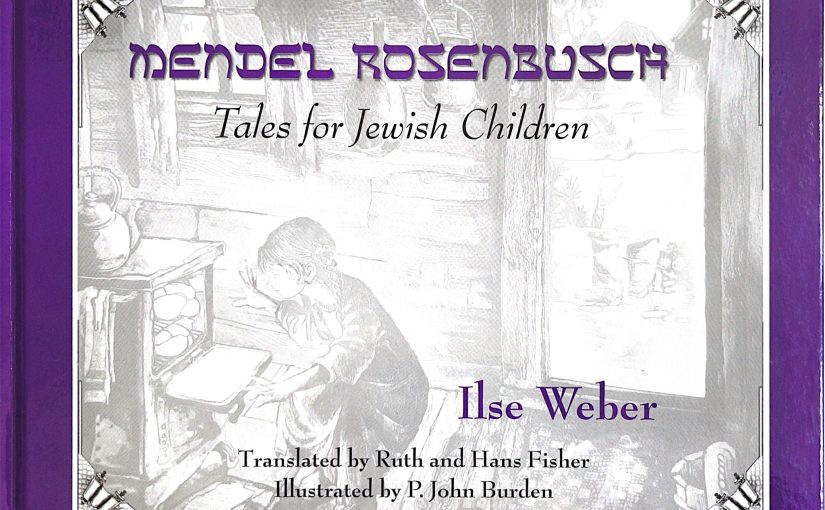The marvelous children’s stories in Ilse Weber’s Mendel Rosenbusch: Tales for Jewish Children (illustrated by P. John Burden) are fascinating in their own right, as is translator Hans Fisher’s discovery of this book. He and his wife, Ruth, have brought Weber’s book, first published in 1929, from the original German to English.
Let’s get to stories first; then we’ll talk about how this book was discovered.
Ilse Herlinger Weber was born 1903 in Witkowitz, now in Czechia, and, after a period of time in Theresienstadt with her husband and son, was deported to and murdered in Auschwitz in October 1944. She was a Czech poet and writer who, like Kafka, wrote in German, and is best known for Mendel Rosenbusch: Tales for Jewish Children.
The title character is an older man (pictured with a white beard and wearing a black yarmulke) who gets a coin that enables him to become invisible whenever he wishes, and he uses this gift to help his neighbours anonymously. Mendel plays a beneficent role in most of the stories, including magically arranging that a stubborn father permits his son to marry the girl of his choice, and is beloved by all the children in Weber’s stories.
One of my favourites – perhaps because he reminds me of a combination of Tom Sawyer and Huck Finn, with a blend of some of the rascals in Sholem Aleichem’s stories – is “Uri, the Rascal.” Uri is a lad who always gets into trouble, always plays pranks. But, when a poor, sickly boy, the son of a needy widow, becomes his seatmate in school, Uri does his best to help and defend him, and even comes up with an idea on Purim to help the mother and son.
Another charming tale is “Simcha, the Liar,” about a boy who cannot stop telling fibs – until, one day, he suffers a punishment (purple patches on his face) for his uninterrupted stream of untruths. But, here again, Mendel Rosenbusch comes to the rescue and Simcha never tells another lie again.
These are typical of the heart-warming, ethically pointed stories in this book. Now to its (re)discovery.
When Hans Fisher, who taught at Rutgers University in New Jersey for many years, visited Santiago, Chile, for his mother-law’s funeral, he discovered in her vast library a book of children’s stories in German that he had read as a child in Germany 60 years earlier, before immigrating to the United States to escape the Nazi slaughter of Jews. Like Proust’s biscuit, which brings a flood of memories to the author as he remembers the past, so with Fisher. Seeing this old, torn book brought back memories of wonderful, gentle stories that, in Fisher’s words, “transported me to my own boyhood in Breslau.”
It is with love and devotion and the translators’ writerly skills that Ruth and Hans Fisher have restored these wonderful tales and made them accessible to a new generation of readers.
Curt Leviant also recently made a literary discovery of his own. He found a neglected novel by the famous Yiddish humourist Sholem Aleichem, Moshkeleh the Thief, which he translated into English: for a review, see jewishindependent.ca/a-rediscovered-novella. Leviant’s 12th novel, Me, Mo, Mu, Ma & Mod; Or Which Will It Be, Me and Mazal or Gila and Me?, was published in 2021.

